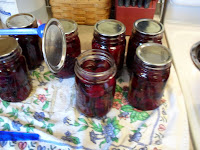Glass canning jars come in a variety of sizes. Select the size that best suits your needs.
Canning lids are a 2 piece system, the flat metal lid with a sealing compound on the underside and a threaded metal screw band that fits over the rim of the jar to hold the lid in place during processing. The lids are NOT reusable, however the metal rings are.
Select jars that are free of cracks and chips. Wash them in hot soapy water, rinse well. The jars must be heated for at least 10 minutes in boiling water and kept hot until they are filled. I like to wash jars in the dishwasher with the heat dry cycle. I just pull out the jars when needed.

Select the appropriate lid/band size. Place the flat canning lids in boiling liquid, enough to cover the lids and simmer for 10 minutes keeping the lids in the simmering water until ready to use. This helps prepare the sealing compound ensuring a vacuum seal.
Measuring Headspace
Headspace is the space between the top of the jar and the food or liquid. Usually low acid foods, vegetables and meats leave a 1 inch head space. High acid foods like tomatoes, pickles, fruits and relishes leave 1/2 inch headspace. Juices, jellies and jams leave 1/4 inch head space.
Removing Air Bubbles

After the food has been packed into the jars the air bubbles must be removed. Use a nonmetallic spatula pressed between the food and the inside of the jar. Press against the food to release the bubbles.
Cleaning Jar Rims
The rim of the jar must be wiped clean of any food or liquid. This can prevent the jar from sealing properly.
Adjusting Lids and Bands
 After the jar has been filled and rim wiped clean, place the lid, sealing compound side down, on the rim of the jar. Place the band over the lid and screw down until fingertip tight.
After the jar has been filled and rim wiped clean, place the lid, sealing compound side down, on the rim of the jar. Place the band over the lid and screw down until fingertip tight.Your jars are now ready for the water canner
Or..the Pressure Cooker!
Using a Water Canner
A boiling-water canner is a large pot made stainless steel, aluminum or enamel on steel. It has a wire wrack that sits on the bottom and a lid.
Foods that are high in acid can be processed in a boiling-water canner. Pickles, jellies, jams, fruits, and salsa are some examples. Filled, capped jars are submerged into boiling water. The water must cover the jars. The processing times vary, you must make sure you have the correct processing time for your particular food as well as you altitude.
Using a Pressure Canner
Pressure canners are made from a heavy gauge stainless steel. The lid locks down and seals tightly onto the main base. It has vent pipe and a safety valve. It has either a Dial Gauge or a Weighted Gauge.
Dial Gauge:



